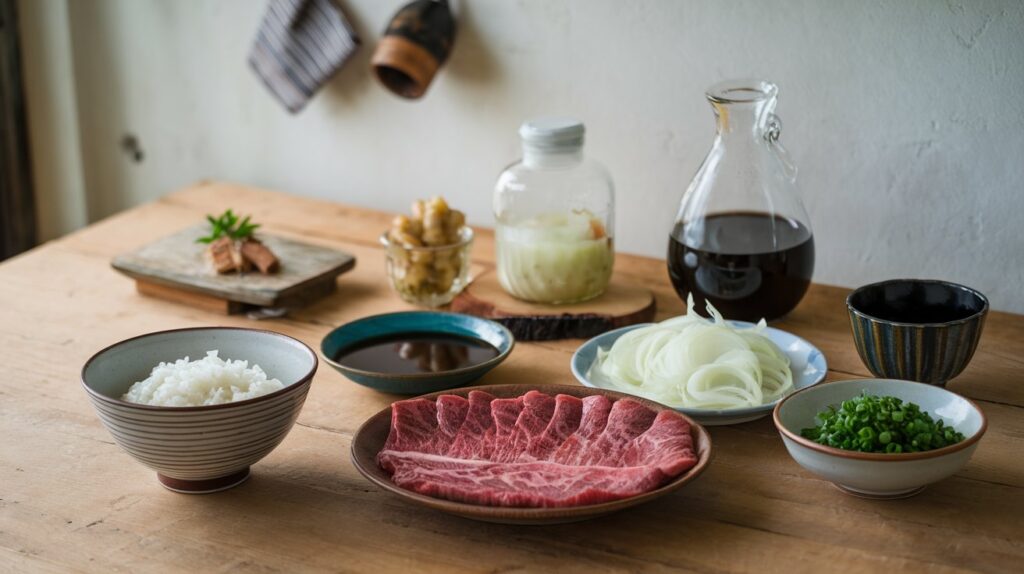Japanese Beef Bowl: A Savory Taste of Japan
Imagine walking into a bustling Japanese eatery. The air is filled with the tantalizing aroma of thinly sliced beef simmering in a sweet and savory sauce. As you take your seat, a steaming bowl of gyudon—Japanese Beef Bowl—is placed before you, complete with tender beef, caramelized onions, and perfectly cooked rice. This simple yet flavorful dish captures the essence of Japanese comfort food, and today, you’re about to bring that experience into your kitchen.
Crafting a Japanese Beef Bowl at home is not only easy but also deeply satisfying. With a few authentic ingredients and some handy tips, you’ll be serving up restaurant-quality gyudon that will impress family and friends alike.
What is a Japanese Beef Bowl (Gyudon)?
The Japanese Beef Bowl, known as gyudon in Japanese, is a beloved staple in Japan’s fast-food culture. Translating to “beef bowl,” this dish is a harmonious blend of tender beef slices, onions, and a savory-sweet sauce, all served over hot steamed rice.
Originating in the late 19th century during Japan’s modernization, gyudon gained popularity as an affordable and quick meal for busy workers. Its delicious simplicity has made it a favorite across generations, with variations found in both home kitchens and restaurants.
Ingredients for an Authentic Japanese Beef Bowl
To make the perfect Japanese Beef Bowl, you’ll need a handful of simple ingredients. Here’s what to gather:
 Core Ingredients
Core Ingredients
| Ingredient | Quantity | Notes |
|---|---|---|
| Thinly sliced beef | 300g | Preferably ribeye or sirloin, sliced thinly |
| Onion | 1 medium | Sliced into thin wedges |
| Soy sauce | 3 tbsp | Japanese soy sauce for authenticity |
| Mirin (sweet rice wine) | 2 tbsp | Adds a subtle sweetness |
| Sugar | 1 tbsp | Granulated or brown sugar |
| Dashi broth or water | 1 cup | Enhances umami flavor |
| Cooked rice | 2 cups | Hot, steamed Japanese short-grain rice |
Optional Garnishes
- Pickled ginger (beni shoga)
- Chopped green onions
- Raw egg or soft-boiled egg
How to Make a Japanese Beef Bowl: Step-by-Step Recipe
Preparing the Ingredients
Before you start cooking, ensure all your ingredients are ready:
- Thinly slice the beef. If you’re slicing at home, slightly freeze the beef first for easier handling.
- Slice the onion into thin wedges, ensuring even cooking.
Cooking Instructions
- Sauté the onions:
Heat a large pan or skillet over medium heat. Add a small amount of oil and sauté the onions until they become soft and translucent. - Simmer the sauce:
Pour the dashi broth (or water), soy sauce, mirin, and sugar into the pan with the onions. Stir gently until the sugar dissolves completely. - Cook the beef:
Add the thinly sliced beef to the simmering sauce. Allow it to cook evenly, turning gently to coat it in the flavorful broth. This should only take a few minutes. - Assemble the bowl:
Fill a bowl with hot steamed rice. Spoon the beef and onion mixture over the rice, making sure to include some sauce for extra flavor.
Pro Tip
Let the beef sit in the sauce for a minute before serving to allow it to soak up the flavors fully.
Variations on the Classic Japanese Beef Bowl
While the traditional gyudon recipe is a classic, you can customize it to suit your taste. Here are a few popular variations:
Spicy Beef Bowl
Add a dash of chili oil or sprinkle shichimi togarashi (Japanese seven-spice blend) for a spicy kick.
Vegetarian Gyudon
Replace beef with mushrooms or tofu. Adjust the seasonings slightly to match the lighter ingredients.
Deluxe Gyudon
Top your beef bowl with a soft-boiled egg, a sprinkle of toasted sesame seeds, or even crispy fried garlic for a gourmet touch.
Why You’ll Love Cooking Japanese Beef Bowls at Home
- Quick and Easy: Gyudon takes less than 30 minutes to prepare, making it perfect for weeknight dinners.
- Budget-Friendly: Using simple, everyday ingredients, you can recreate this restaurant-quality dish at home without breaking the bank.
- Customizable: Whether you prefer it spicy, vegetarian, or loaded with toppings, the possibilities are endless.
Tips for Perfecting Your Japanese Beef Bowl
- Choose quality beef: Marbled cuts like ribeye or sirloin work best for gyudon, delivering tenderness and flavor.
- Don’t skip the dashi: This umami-rich broth is key to achieving an authentic taste. If unavailable, a mix of water and soy sauce can work in a pinch.
- Serve fresh: Gyudon tastes best when served immediately after cooking, while the beef is juicy and the rice is steaming hot.
Frequently Asked Questions About Japanese Beef Bowls
Can I use a different cut of meat?
Yes! While ribeye or sirloin are ideal, you can use flank steak, ground beef, or even chicken. Just ensure the meat is thinly sliced for even cooking.
How do I store leftovers?
To store leftovers, keep the beef and sauce separate from the rice in airtight containers. Refrigerate for up to two days and reheat gently before serving.
What can I substitute for mirin?
If you don’t have mirin, combine rice vinegar with a pinch of sugar or use sweet white wine for a similar effect.
Conclusion: Your Perfect Japanese Beef Bowl Awaits
Bringing the flavors of Japan into your home has never been easier. With its rich umami profile and satisfying simplicity, the Japanese Beef Bowl is a dish that will become a staple in your recipe collection. Whether you’re making it for a quick dinner or to impress guests, gyudon delivers on all fronts.
Ready to bring a taste of Japan into your kitchen?
Try this recipe tonight, and don’t forget to share your culinary creations in the comments below. We’d love to hear about your experience and any delicious variations you’ve tried

